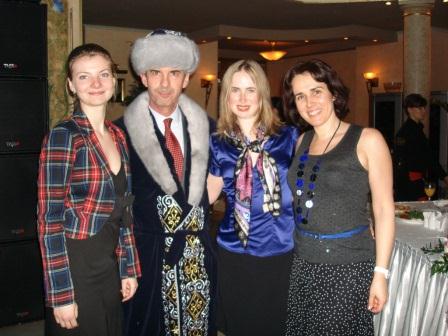July 17th, 2012
As the follow-up of the EXPO 2017 Astana candidacy promotion campaign I worked as a simultaneous translator in Astana at the Symposium which gathered 160 International Bureau of Exhibition’s delegates from all over the world.

Symposium was organized to show Astana to the delegates who will later vote for the city to host EXPO 2017. The idea was to explain in more details the theme of EXPO 2017 – Future Energy as well as introduce delegates to the Kazakh culture, to show places of interest in Astana. So the first day was spent in the palace of Independence where several panel discussions took place. I worked as a simultaneous Russian-English translator and I was lucky to work with simultaneous translators who came from Paris specifically for this Symposium. It was a great opportunity for me to learn something new about simultaneous translation. The day ended with a reception held by the Prime Minister. The guests could listen to Kazakh music and try out Kazakh food.
Next day was dedicated to sightseeing in Astana: Baiterek, Khan Shatyr, Palace of Independence, Pyramid and other places of interest in Astana were shown to the guests.
The voting will take place in Paris in November 2012, we are all looking forward to it and crossing our fingers to get the right to host EXPO 2017 in Astana.
Tags: Astana expo 2017, Expo 2017 translator, translation astana, Translation Services in Astana, Translator Astana
Posted in Astana, EXPO 2017, Foreigners in Kazakhstan, News, Simultaneous translation, Астана
Comments Off on Translation for EXPO 2017 Astana: “Future Energy” Symposium
March 2nd, 2012
This time I worked in the National Testing Center providing English-Russian translation at a series of lectures on evaluation in education.

The lecturer, Dr. Shonau, who came from the Netherlands, gave an overall view on the education system in the Netherlands, on the role of examinations and test in education. He explained different types of taxonomy models: that of Bloom and Romiszowsky, that are the basis for test constructing. Lectures touched upon test types: multiple choice tests, open end tests, written and practical tasks and the ways how to best evaluate each of them. The whole day was dedicated to the final examination and its administration and evaluation criteria as it as done in the Netherlands. Participants: those who develop test items, put them together in a test and later assess the results, took great interest in that part since the final exam that combines both school leaving and university entrance exam in Kazakhstan will no longer exist. The discussions are held as to how change the format of the exam and what is the best practice in the world.
It is obvious that there are differences between the education system in the Netherlands and that in Kazakhstan but still there are similarities, too, and both countries win from learning from each other’s experience.
Tags: english translator almaty, english-russian translation, translation astana, translation Kazakhstan
Posted in Astana, education abroad, Foreigners in Kazakhstan, translation services, Workshops
Comments Off on English-Russian translation at the National Testing Center
